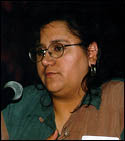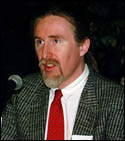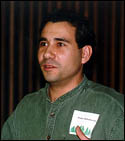Making Diversity a Positive Experience
Rural Diversity Summit, St. Cloud State University, April 22, 1999
Sponsored by Minnesota Public Radio Civic Journalism Initiative
and Minnesota State Colleges and Universities System
Part of MPR's The Hidden Rainbow series.
Education | Religion | Government | Non-profits | Other
As part of the Rural Diversity Summit, the approximately 60 participants divided into four subgroups, representing education, religion, nonprofit organizations and government. Each was asked to recommend a list of social, economic and political strategies or actions steps that individuals or the whole stakeholder group could act upon.
Education Action Steps
"The ultimate goal is to find ways for multi-cultural
students to
succeed in high school and beyond," said Elizabeth Valdez
of Crookston, the
Program Director for Impact Americorps, which provides classroom
and
tutorial assistance for students. Here are some of the group's
recommended
strategies:
"It's often said that Sunday morning is the most
segregated time in
America," said Robert Hulteen, director of the Minnesota
Council of Churches'
Commission on Life and Work, who served as spokesperson for the
faith
communities. "That's probably not a good thing. We split
up into our
tribes, often, when we go to worship. We really need to think
about what
that's about. . . . On the social end, the church really has
the
responsibility to deal with issues of values--justice, peace,
reconciliation. The one that we kept coming back to, no matter
what the
category, was truth-telling. You need to tell the truth despite
what the
costs may be."
This group's tactics included the following:
Nonprofit Organizations Action Steps
Although nonprofit organizations are often funded by large companies and foundations, they need to improve their connection to the communities in which they're located, said group spokesperson Andrea Lex of the League of Women Voters. Sometimes that can be as simple as frequenting local grocery stores. Their action steps include:
Government Action Steps
Attorney Pedro Behamonde served as spokesperson for the
government group. Their suggestions included:
Other
Several audience members added suggestions of their own:
Rural Diversity Summit, St. Cloud State University, April 22, 1999
Sponsored by Minnesota Public Radio Civic Journalism Initiative
and Minnesota State Colleges and Universities System
Part of MPR's The Hidden Rainbow series.
Education | Religion | Government | Non-profits | Other
As part of the Rural Diversity Summit, the approximately 60 participants divided into four subgroups, representing education, religion, nonprofit organizations and government. Each was asked to recommend a list of social, economic and political strategies or actions steps that individuals or the whole stakeholder group could act upon.
Education Action Steps
 |
|
| Elizabeth Valdez
|
- Pressure government, university and local leaders to mandate cultural diversity training for all students.
- Require all students, including minority students, to do volunteer work in the community, thereby promoting a better image for youth in the wider community.
- Require volunteer experience for admission to schools of higher education.
- Get rid of the term "minority", which implies second-class citizenship.
- Require students to go out into the community and study different groups for their own development.
- Portray "diversity" and "difference" as good things, rather than words with a negative connotation.
- Promote public-private economic alliances.
- Since prejudice is reduced by human contact, individuals should
seek
out and nourish multi-cultural friends and neighbors.
 |
|
| Bob Hulteen
|
- Churches need to hold each other accountable; the public needs to hold churches accountable.
- Since racism is both institutional and the result of voluntary associations of people, it's important for churches to deal with racism at both the personal and political levels. As an example, Hulteen cited the Minnesota Council of Churches' anti-racism initiative, which provides churches with training and encourages discussing relevant church teachings.
- Churches should look for ways to deconstruct institutions
that
support racism."The church really has the responsibility to deal with issues of values--justice, peace, reconciliation."Robert Hulteen, the Minnesota Council of Churches

- They should look at and speak for the common good.
- They should correct lies perpetrated in other sectors of American society.
- Churches should make economic decisions that encourage diversity.
- They should promote diversity in hiring and through their own purchasing power.
Nonprofit Organizations Action Steps
Although nonprofit organizations are often funded by large companies and foundations, they need to improve their connection to the communities in which they're located, said group spokesperson Andrea Lex of the League of Women Voters. Sometimes that can be as simple as frequenting local grocery stores. Their action steps include:
- Hire a diverse staff.
- Work to change the attitudes, both of individuals and on the political level.
- Provide support systems for confronting issues of race, immigration, and diversity.
- Be proactive, not reactive.
- Educate the media.
- Help diverse groups of people contribute to the economy by helping them find jobs that pay a livable wage and helping them to improve their education.
- Non-profits can also help diverse groups contribute to our economic and political life.
Government Action Steps
 |
|
| Pedro Behamonde
|
- City councils should be more proactive in promoting diversity, for example by becoming active in different communities.
- Government should pass legislation that encourages diversity, for example by encouraging or even requiring businesses to provide services in the language of the people they serve.
- Help to organize people at the grass-roots level so that they can be empowered.
- People in government should participate in cultural events in diverse communities.
- Governments should hire a multi-cultural workforce. In order to do so, they should try to reach targeted populations through local minority publications and other avenues.
- Government should hold unions accountable for helping to promote a multi-cultural workforce, perhaps through lawsuits.
- In order to improve the provision of services to people who
do not
speak English, governments should look at translation services provided by both health care providers and the criminal courts."The ultimate goal is to find ways for multi-cultural students to succeed in high school and beyond."Elizabeth Valdez, Impact Americorps

- Government should find ways to make teachers more sensitive towards issues of diversity.
- Government should build more clean, safe and affordable public
housing.
Other
Several audience members added suggestions of their own:
- Make city council members accountable. Invite them to your group's meetings. "It's a two-way street," this person said. "If you don't ask, you won't get any answers."
- People of color need to run for office. "If you don't
want to
run," another person said, "then you need to find somebody
else who
represents your issues to run. . . . Once you have somebody to
speak to on
the city council or at the legislature, you'll make changes."
Bob Hulteen of the Minnesota Council of Churches also described a year-long event inspired by Pentecost, the Christian feast commemorating the descent of the Holy Spirit onto the Apostles. (Hulteen described the Pentecost as a metaphor for diversity--a Biblical antidote to the Biblical story of the Tower of Babel, in which God divided people into language groups so that they could not understand one another. "They came with different languages, but all of a sudden they could understand each other," Hulteen said. "They knew what the others were saying even though they were speaking their own languages.")
Every Sunday from Pentecost 1999 (May 23) until Pentecost in the year 2000 (June 11) a different congregation in Minnesota will pray for racial justice and reconciliation. And on Pentecost 2000, churches will participate in a statewide "truth telling" to speak of historical problems--and pray for reconciliation.
